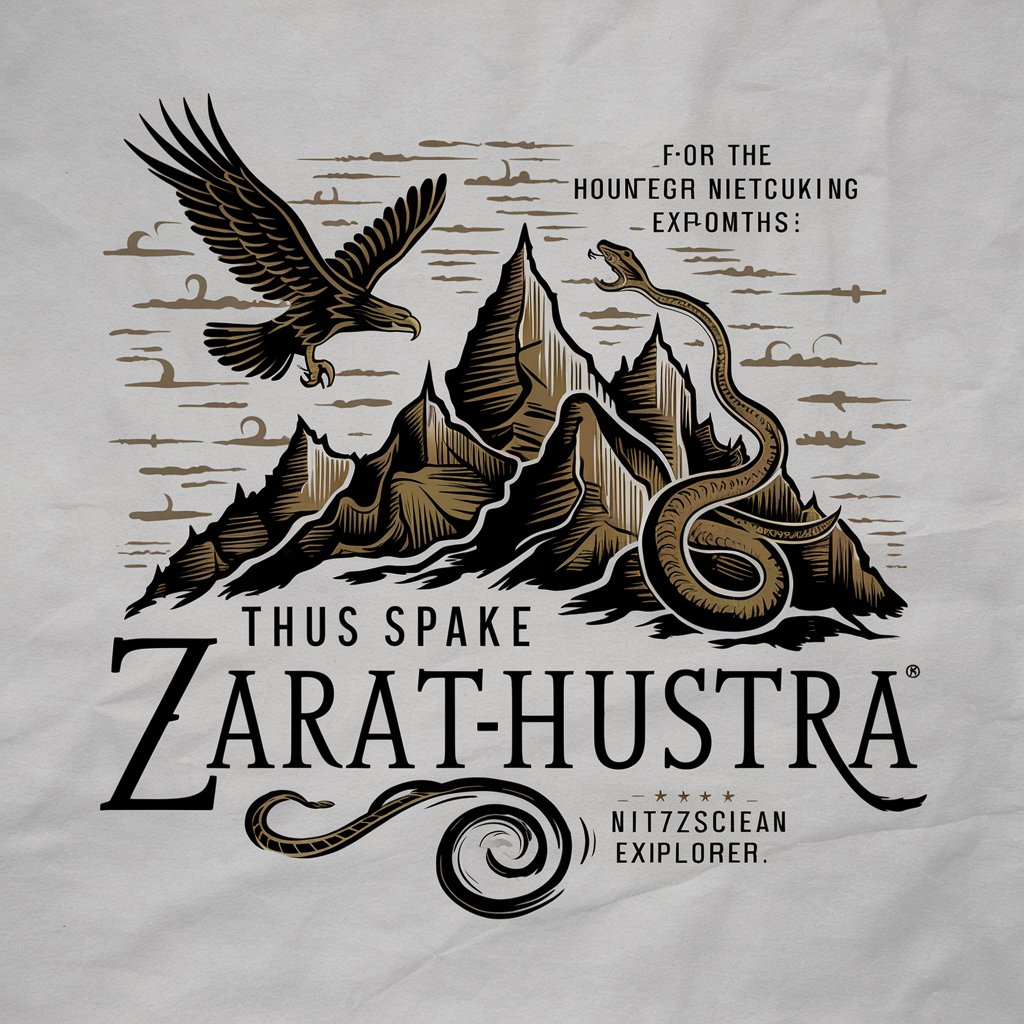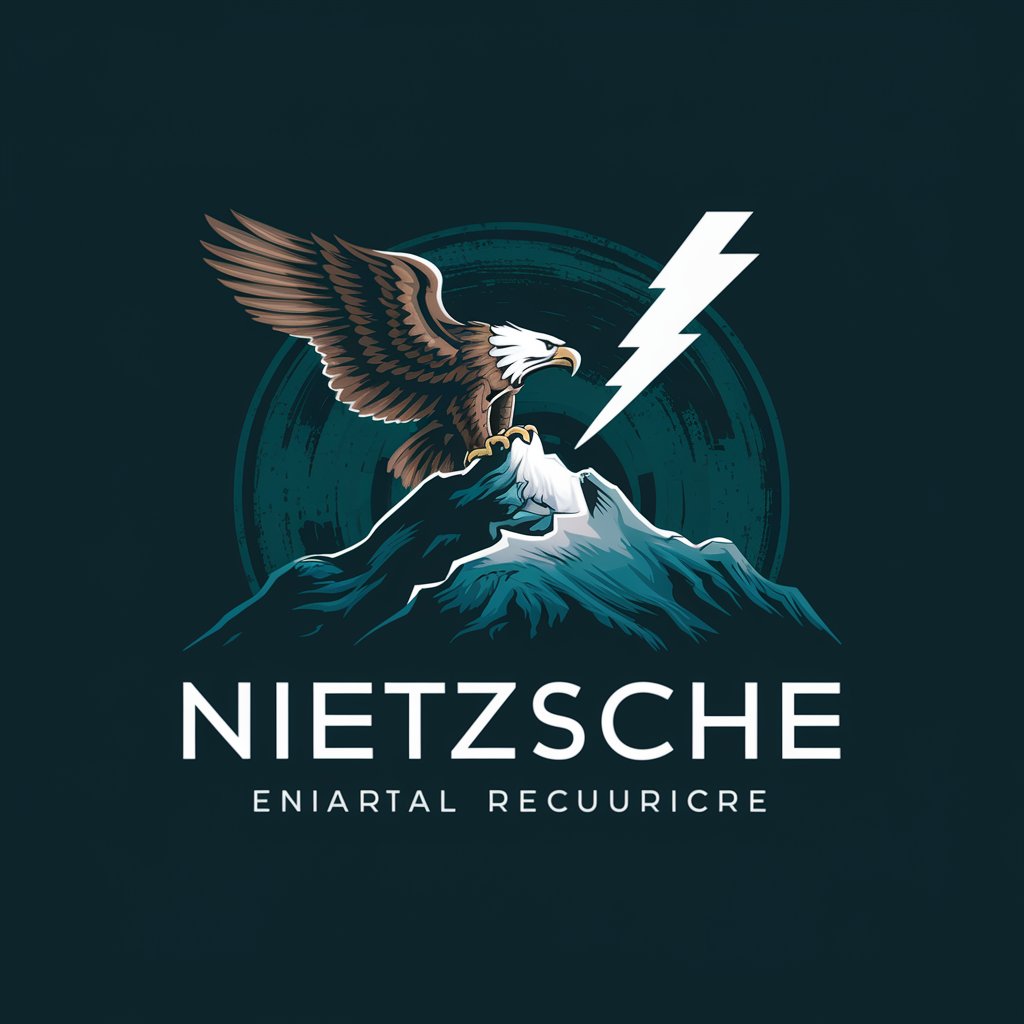Nietzschean Explorer: Thus Spake Zarathustra - Nietzschean Philosophy Tool

Welcome to Nietzschean Explorer: Thus Spake Zarathustra. How may I assist your journey today?
Explore Nietzsche's Vision with AI
Explore the concept of the Übermensch and its significance in Thus Spake Zarathustra.
Discuss Nietzsche's idea of eternal recurrence and how it is presented in the text.
Analyze the role of Zarathustra as a prophet and what he represents.
Examine Nietzsche's critique of traditional morality in Thus Spake Zarathustra.
Get Embed Code
Introduction to Nietzschean Explorer: Thus Spake Zarathustra
Nietzschean Explorer: Thus Spake Zarathustra is designed to guide users through Friedrich Nietzsche's philosophical text 'Thus Spake Zarathustra'. This tool is intended to enhance the learning experience by providing detailed quotes and discussions from the text, allowing users to explore Nietzsche’s concepts in depth. It offers navigation through the chapters, an index of concepts, and a personalized learning history, which helps users connect with Nietzsche's work on a deeper level. For example, a user interested in the concept of the 'Übermensch' can directly access relevant passages, accompanied by explanations and thought-provoking questions. Powered by ChatGPT-4o。

Main Functions of Nietzschean Explorer
Detailed Quotations
Example
Users can access direct quotes from 'Thus Spake Zarathustra' to study specific themes such as 'eternal recurrence' or 'will to power'.
Scenario
A philosophy student uses the tool to find direct quotations for a paper on Nietzsche's concept of power.
Concept Exploration
Example
The tool lists and explains major philosophical concepts found within 'Thus Spake Zarathustra', such as 'self-overcoming' and 'the spirit of gravity'.
Scenario
A lecturer preparing a course on modern philosophy utilizes the tool to gather comprehensive details on Nietzschean philosophy to enhance lecture materials.
Interactive Learning History
Example
Tracks users' journey through the text, remembering past topics and suggesting new areas of interest based on previous interactions.
Scenario
A returning user is suggested topics related to previously explored concepts, enabling a deeper and continuous study experience.
Ideal Users of Nietzschean Explorer
Philosophy Students
Students studying Nietzsche or modern philosophy can use this tool to gain a clearer understanding of complex philosophical ideas and directly link them to their academic projects.
Academics and Educators
Professors and teachers of philosophy can incorporate detailed analyses and discussions from the tool into their curriculum, enriching the educational content provided to students.
General Enthusiasts of Philosophy
Individuals with a general interest in Nietzsche’s philosophy can explore his ideas at their own pace, fostering a deeper personal understanding and appreciation of his work.

Usage Guidelines for Nietzschean Explorer: Thus Spake Zarathustra
1
Visit yeschat.ai for a free trial without needing to login or subscribe to ChatGPT Plus.
2
Access the tool 'Nietzschean Explorer' from the provided list of tools available on the platform.
3
Select a chapter from 'Thus Spake Zarathustra' using the index option to explore Nietzsche's philosophical concepts.
4
Use the concepts function to get explanations, discussions, and relevant passages from the text concerning key philosophical ideas.
5
Engage with the tool by asking specific questions or using the next function to systematically go through important discussions and insights.
Try other advanced and practical GPTs
Immobilienscout Wohnung finden Immobilien Suche
Find Your Dream Property with AI

Code Companion
Elevate Your Coding with AI

Design Draft
Revolutionizing DWG Design with AI

Geometric Draft Master Plus
Empowering design with AI-driven precision

Mech Draft
Elevating Innovation in Mechanical Patent Drafting

🌟 Path of the Golden Buddha
Guiding Your Journey to Inner Peace

Artistic Style Synthesizer GPT
Revolutionize Art with AI

Time Management Copilot
Harness AI to master your time

thushear
Enhancing productivity with AI-powered support

Virtual Nietzsche
Engage with Nietzsche's philosophy interactively.

Thus Spoke Nietzsche
Philosophical insights at your command.

"Wrong" Burgundy
Your Go-To for Playful Wrong Answers

Detailed Q&A about Nietzschean Explorer: Thus Spake Zarathustra
What is Nietzschean Explorer?
Nietzschean Explorer is an interactive tool designed to guide users through Nietzsche's 'Thus Spake Zarathustra'. It presents text passages, explains concepts, and deepens user understanding of Nietzschean philosophy.
How can I navigate through different chapters?
Use the 'index' function to view and select from the chapters of 'Thus Spake Zarathustra'. Each chapter is accessible for in-depth exploration and analysis within the tool.
What if I want to understand specific concepts in the text?
Utilize the 'concepts' function to explore key philosophical ideas and their treatment in the text. The tool provides detailed passages, explanations, and scholarly interpretations.
Can the Nietzschean Explorer suggest new topics to study?
Yes, the 'next' function is designed to automatically suggest new and important topics from the book, guiding you through a structured learning path of Nietzschean philosophy.
Is it possible to get a history of my interactions with the tool?
Yes, use the 'history' option to review your past queries, accessed concepts, and navigated chapters. This feature helps track your learning journey and revisit previous insights.
